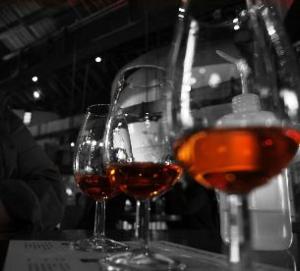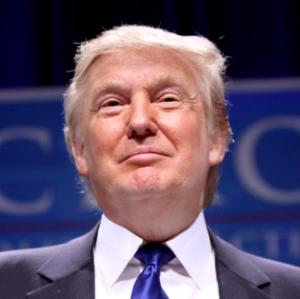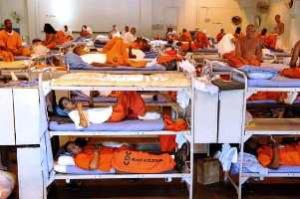This article was produced in collaboration with AlterNet and first appeared here.
As incoming president, Donald Trump will be, among other things, the man in charge of the nation's drug policy. Whether he takes a hand-on, direct approach to policy-making or whether he delegates decision-making authority on drug matters to subordinates -- think Attorney General Jeff Sessions and shudder -- the buck ultimately stops with Donald.

There's also a huge cry for drug treatment in response to increasing heroin and prescription opioid use. Will a Trump administration be sympathetic? And what about harm reduction -- needle exchanges, supervised consumption sites, and the like? Do such programs have a future under Trump?
The short answer is: Who knows? Trump is proving day by day that how he governs will not necessarily have much correlation with anything he said on the campaign trail. And, as with his approach to many policy areas, what he has said about drugs, both during the campaign and in his earlier life, sounds both spur-of-the-moment and self-contradictory.
But Trump is not just a rather unpredictable president-elect. He's also a person with his own personal and family history, and that history includes a close encounter with substance abuse that sheds some light on his attitudes towards drugs and may influence his drug policy decision-making.
Donald Trump's older brother, and his overbearing father's namesake, "Freddy, Jr." was a full-blown alcoholic by his mid-20s (and Donald's teens) and drank himself into an early grave at the age of 43 in 1981. Freddy wasn't ready to take over the family business and instead became a fun-loving airline pilot, but his descent into the bottle had a traumatic -- and lasting -- impact on his little brother.

Trump's experience with his brother turned him into a teetotaler, although he does swill Diet Coke instead. And he admits to one other "vice" in revealing terms. In a 2007 video, he said that hot women are his "alcoholism," especially "beautiful" teens.
"I never understood why people don't go after the alcohol companies like they did the tobacco companies," he continued in the Esquire interview. "Alcohol is a much worse problem than cigarettes."
Still, the free-wheeling marketeer wasn't ready to reinstate Prohibition because of Freddy, and that attitude extended to drugs. In the early 1990s, Trump reportedly talked about drug legalization, calling drug law enforcement "a joke" and saying "You have to legalize drugs to win that war. You have to take the profits away from these drug czars."
But Trump was singing a different tune on the campaign trail, especially in New Hampshire, which has been hit hard by the opioid wave. In a November 2015 interview with ABC News' Martha Raddatz, Trump backtracked.
"Well, I did not think about it," he confessed. "I said it's something that should be studied and maybe should continue to be studied. But it's not something I'd be willing to do right now. I think it's something that I've always said maybe it has to be looked at because we do such a poor job of policing. We don't want to build walls. We don't want to do anything. And if you're not going to want to do the policing, you're going to have to start thinking about other alternatives. But it's not something that I would want to do."

And in an October 15 speech in New Hampshire, where he made his most coherent remarks about drug policy, he was mainly about building the wall on the Mexican border to stop the flow of heroin from Mexico. But in that speech, he at least sketched the outlines of response that included increased access to the overdose reversal drug naloxone, increased reliance on drug courts, and increased access to the silver bullet of drug addiction, "abuse-deterring drugs." But he didn't say anything about how much he would be willing to spend on treatment and recovery (Hillary Clinton rolled out a $10 billion plan), nor how he would pay for it.
As with many policy areas, Trump's positions on drug policy are murky, seemingly only half-developed, and full of potential contradictions. Will having a teetotaler with a dead alcoholic brother in the White House make for better drug policies or an administration more understanding of the travails of addiction? As with many things Trump, we shall have to wait for his actions. Nominating drug war hardliners like Sen. Jeff Sessions (R-AL) to head the Justice Department and giving Vice President-elect Mike Pence props for enacting mandatory minimum drug sentences aren't good omens, though.
This work by StoptheDrugWar.org is licensed under Creative Commons Attribution-ShareAlike 4.0 International
Comments
Trump appears to have only
Trump appears to have only one guiding principle -- his own personal wealth.
Corporations aren't people. If they were, they would look and act a lot like Trump, as follows: if it makes them money, it's "good" and they're for it; if it costs them money, it's "bad" and they're against it. When they're for it, they will be marketing for it, and no lie is to repugnant to use if it "works." Similarly, when they're against it, any noise they make that "works" is appropriate in their eyes; and truth and integrity be damned -- irrelevant.
So, setting aside his personal history for a moment, we can predict what he will do based on his only guiding principle: personal wealth. And since there has always been more money to be made supporting drug prohibition than in legalizing drugs, and given his nomination of Sessions as AG, I think we should assume Trump is a serious threat to the legalization movement. His personal financial gains are more likely to be tied to prohibition than legalization.
It is risky to assume that anything Trump says is true, even when he is talking about his family and his older brother who died from addiction to alcohol and cigarettes, or even about his supposedly "drug free" lifestyle. But let's work with what we've got.
It is important to understand that we live in an alcoholic society, from a cultural point of view. Our culture operates on the view that drinking alcohol is normal for a person, and that anyone who can't drink responsibly has a character flaw or a moral problem. This is what allows people with a drink in one hand and a cigarette in the other to say, "I'm against drugs and drug legalization!" without getting tossed out of the bar for being an asshole.
When this paradigm fails, as it always will, and people lose their brothers and sisters and sons and daughters and mothers and fathers to drug addiction, survivors who witness this carnage will sometimes, understandably, choose to toss the entire lot onto the fire. If even alcohol and cigarettes are that "bad", they reason, then all other drugs must be even worse: REALLY, REALLY bad! This is not true, of course, but our alcoholic culture sets that bias for error.
At a guess, Trump's family experiences with his brother are likely to make him less sympathetic to marijuana legalization, not more so. And this is tragic, because it perpetuates the cycle of alcoholism in USA.
Trump's Addictions
Trump's addicted to the high he gets from revenge, from pussy grabbing, from "sort of getting away with it."
What were people thinking when they voted for this guy?
If you are a marijuana consumer/patient and voted for this madman you should be ashamed of yourselves for being conned by an egomaniac with racist and xenophobic tendencies, not to mention has no respect for women. And you expect this maniac to have respect for "drug users?"
Get ready for Reagan Drug War 2.0. My guess he will take a hands off approach to marijuana and let his attorney general Sessions wreak havoc on the newly emerging legal marijuana landscape. He will say nothing! He will try to change the subject and not go there. He will stop nothing! He will be enforcing the laws as far as he is concerned. Because this orange orangutan has said he is "committed to Law and Order." That means locking up pot dealers, growers and consumers/patients.
The legal marijuana community should have seen this coming! Where was this website before the election? This site should have been warning people about Trump from the beginning!
In reply to What were people thinking when they voted for this guy? by Anon (not verified)
Reply to "What were people thinking when they voted for this guy
Talk about hitting the nail directly on the head. I couldn't agree more and I am glad I didn't vote for either of the major presidential scoundrels. Both were clearly unacceptable to me in every area and I wasn't going to simply hold my note and pull the lever for the Democrat or the Republican. Both parties failed 60% of the electorate. What is of my major concern now is the havoc that this man will wreak before he is impeached or incinerated by the nuclear exchange he will surely invoke. My money is that Trump will do everything in his considerable presidential power to destroy the reform in Drug Policy and renew another phase of the War on Drugs.
Trump's brother
If brother was 'fullblown' cannabis addict, he'd still be alive
and would not have destroyed his physical health either. Maybe someone Trump pays attention to will make that point to him about alcohol vs. cannabis. But his inner circle seems full of cannabis haters who have no intention of being honest about alcohol vs. cannabis.
Add new comment